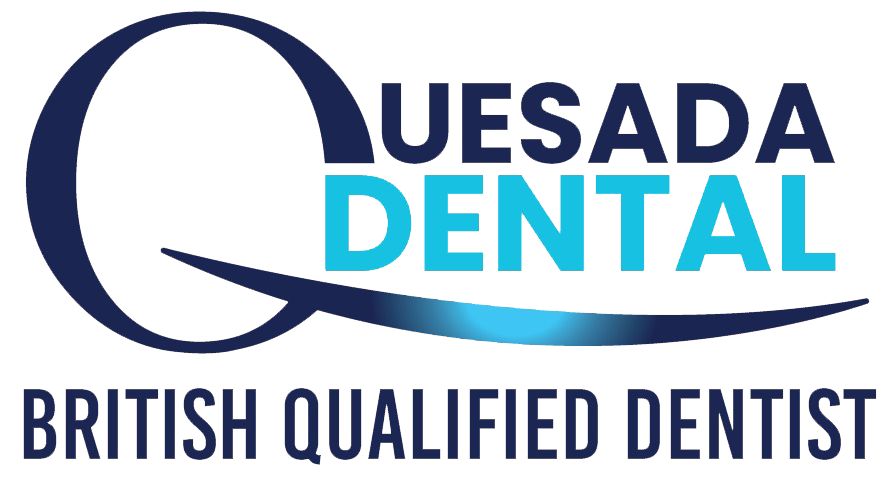Top quality dentures
Dentures to help restore our patients’ self-confidence and quality of life
At Quesada Dental, we can create natural, individualised, top quality dentures to help restore our patients’ self-confidence and quality of life. People wear dentures to replace lost or missing teeth so they can enjoy a healthy diet and smile with confidence. Dentures are made of either acrylic (plastic) or metal. There are so many variables to consider when having a new denture and choices on offer and we can work to find a bespoke treatment option, which yields fantastic results for our patients.

Advanced Dental Clinic
Best Practice at a Better Price
Emergency Dental Appointments
A ‘complete’ or ‘partial’ denture
A ‘complete’ or ‘full’ denture is one, which replaces all of the natural teeth in either the upper or lower jaws.
A ‘partial’ denture fills in the spaces left by lost or missing teeth. It may be fastened to your natural teeth with metal clasps or ‘precision attachments’.
In these days of modern dental care, more and more people are holding on to many of their natural teeth throughout their entire life. However, circumstances have not always made this possible for everyone. We acknowledge this and care for those who have not been able to keep their own teeth with respect and compassion. We work closely with our highly skilled local registered dental technician to care every bit as professionally for our patients needing denture provision as any other type of treatment.
Why have denture treatment?
Replacing lost or missing teeth has substantial benefits for your health and appearance. A complete or full denture replaces the natural teeth and provides support for the cheeks and lips. Without this support, sagging facial muscles can make a person appear older and reduce their ability to eat and speak.
Are dentures my only option?
No. Bridges and Implants are another option to potentially consider.
How soon can I have a denture after my teeth are taken out?
Usually dentures can be fitted straight after your teeth have been removed. These are called ‘immediate dentures’. You visit the dentist beforehand for them to take measurements and impressions of your mouth. With immediate dentures, you don’t have to be without teeth while your gums are healing. However, bone and gums can shrink over time, especially during the first six months after your teeth have been taken out. If your gums shrink, your immediate dentures may need relining, adjusting or even replacing. Your dentist will be able to discuss this with you. Sometimes your dentist may advise you to wait until your gums are healed before having your dentures, as this can sometimes provide a better fit. Healing may, however, take several months.
Will dentures make me feel different?
Replacing lost or missing teeth is very good for your health and appearance. A complete or full denture replaces your natural teeth and gives support to your cheeks and lips. Without this support, sagging facial muscles can make a person look older and they will find it harder to eat and speak properly. Dentures can be made to closely match your natural teeth so that your appearance hardly changes. Modern dentures may even improve the look of your smile and help fill out the appearance of your face.
Will I be able to eat with dentures?
Eating will take a little practice. Start with soft foods cut into small pieces. Chew slowly using both sides of your mouth at the same time to prevent the denture from moving. As you become more used to your denture, add other foods until you return to your normal healthy diet.
Will dentures change how I speak?
Pronouncing certain words may require practice. Reading out loud and repeating difficult words will help.
If you find that your dentures occasionally slip when you laugh, cough or smile, reposition the denture by gently biting down and swallowing. If this continues consult your dentist.
How long should I wear my dentures?
During the first few days, you may be advised to wear them for most of the time, including while you are asleep. After an initial period of adjustment your dentist may advise that you remove them before going to bed. This allows your gums to rest and helps promote oral health.
Should I use a denture fixative?
Dentures are custom made to fit your mouth and you shouldn’t need a denture fixative. However, over time, dentures may become loose and not fit as well. When this happens, some people prefer to use a fixative for a short time before having them replaced. A poorly fitting denture may cause irritation and sores. This can often happen if you have worn immediate dentures for some time.
Must I do anything special to care for my mouth?
Even with full dentures, you still need to take good care of your mouth. Every morning and evening, brush your gums, tongue and the roof of your mouth with a soft-bristled brush. This removes plaque and helps the circulation in your mouth. If you wear partial dentures, it is even more important that you brush your teeth thoroughly every day. This will help stop tooth decay and gum disease that can lead to you losing more of your teeth. Your dentist may refer you to the hygienist to have your remaining natural teeth cleaned regularly.
What is the difference between Conventional and Immediate Dentures?
Conventional dentures are made and inserted after teeth have been removed and the tissues have healed. Healing may take several months.
Immediate Dentures are inserted immediately after teeth have been removed. To do this, the dentist takes measurements and impressions of your mouth during a preliminary visit.
An advantage of Immediate Dentures is that the wearer does not have to be without teeth during the healing period. However, bone and gums can shrink over time, especially during the first six months after teeth have been removed. When gums shrink, Immediate Dentures may require relining or even replacing to fit properly.
What will dentures feel like?
New dentures may feel awkward or even uncomfortable for a few weeks until you become accustomed to them. The dentures may feel loose while the muscles of your cheek and tongue learn to keep them in place. Should this continue, consult your dentist.
It is not unusual to experience minor irritation or soreness during this period. You may also find that saliva flow temporarily increases. As your mouth becomes accustomed to the dentures, these problems should diminish. If any problems persist, particularly irritation or soreness, be sure to consult your dentist
How do I take care of my dentures?
The general rule is: brush, soak, brush. Always clean your dentures over a bowl of water or a folded towel in case you drop them. Brush your dentures before soaking, to help remove any food debris. Using an effervescent (fizzy) denture cleaner will help remove stubborn stains and leave your denture feeling fresher. Always follow the manufacturer’s instructions. Then brush the dentures again, as you would your own teeth, being careful not to scrub too hard as this may cause grooves in the surface. Most dentists advise using toothpaste and a small- to medium-headed toothbrush. Make sure you clean all the surfaces of the dentures, including the surface, which touches your gums. This is especially important if you use any kind of denture fixative. If you notice a build up of stains or scale, have your denture cleaned by your dentist or hygienist.
Will my dentures need to be replaced?
Over time, your dentures will need to be relined or re-made due to normal wear or a change in the shape of your mouth. Bone and gum ridges can shrink, causing your jaws to meet differently. Loose dentures can cause health problems, including sores and infections, not to mention discomfort. A loose or ill-fitting denture can also make eating and talking more difficult. It is important to replace worn or poorly fitting dentures before they cause problems.
How often should I see my dentist?
Regular dental check-ups and having your teeth professionally cleaned are vital for keeping your teeth and gums healthy. Most dentists recommend a dental check up at least once a year. Regular visits allow your dentist to check the soft parts of your mouth, including the tongue and cheeks. These examinations are important so the dentist can spot any infections, mouth conditions or even mouth cancer at the earliest stages. Full denture wearers should check with their dentist about how often they should visit. With regular professional care, a positive attitude and persistence, you can become one of the millions of people who wear their dentures with a smile.
What is a partial denture?
This is a plate with a number of false teeth on it. It may be all plastic or a mixture of metal and plastic. Both types may have clips (clasps), to help keep the denture in place in the mouth. Depending on where they are, some of these clips may show when you smile or open your mouth.
What is the difference between a plastic partial denture and one that contains metal?
Plastic partial dentures are less expensive to make. But unless they are designed very carefully they can damage the teeth they fit against. Metal partial dentures are usually from an alloy of cobalt and chromium and they are much stronger. They are lighter to wear and can be supported by the remaining teeth. Although the base is metal, they have gum-coloured plastic and natural-looking teeth fixed to them. They are more expensive than the plastic ones.
How do I choose the best type for me?
Quesada Dental is highly experienced at making quality dentures. Be guided by your dentist. He or she will know the condition of your remaining teeth. In most cases a metal-based partial denture gives the best result, but the higher cost may make you decide against it.
Different types of denture available are:
- Acrylic
- Chrome
- Titanium
- Flexible/Valplast
Contact us!
Call us or fill out the form and we will contact you during our working hours.

